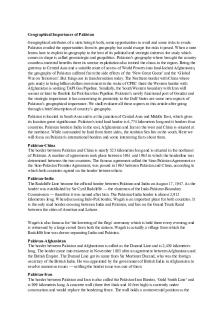Political culture of Pakistan PDF

| Title | Political culture of Pakistan |
|---|---|
| Author | Muhammad Sadiq Naseer |
| Course | Pakistan studies |
| Institution | COMSATS University Islamabad |
| Pages | 11 |
| File Size | 158.6 KB |
| File Type | |
| Total Downloads | 89 |
| Total Views | 179 |
Summary
The processes of trade, manufacturing and services are in a melting pot. The main drivers of change are coming from increased and affordable connectivity being an offshoot of revolution in information and communication technologies (ICTs) and transportation facilities. This change was called rapid g...
Description
Political Culture of Pakistan The political culture of Pakistan is defined by the multiethnic& multilingual and religious orientations and which have been the source of underdevelopment of national identity and political legitimacy of the state two vital prerequisites in the development of any political culture. The history of the country has predominantly witnessed undemocratic culture due to which the demographic linguistic and religious diversities have emerged as adversities with the passage of time The Genesis The regions which became Pakistan were mainly inhabited by large land owners with big base of peasants, and middle class wage earners. Landlords, clerics, bureaucracy and military establishment were dominant on the political landscape of the country since its inception. The pre-partition rural and urban divide was still in place. The politics was concentrated mainly in the hands of a few people who migrated from India and having been displaced, they were more than ready to cut deals with the civil and military bureaucracy. The weak political leadership found itself at loss in the cause of nation building, and unrepresentative institutions of the embryonic state embarked on state building rather than nation building. The long-term affect of all this political wrangling was to cast extraordinary long and dark shadows of undemocratic traditions on Pakistani politics. The degenerating political culture has been highly unsupportive to the cause of bringing cohesion to diverse cultures and different ethno-social orientations. After the partition middle-class professional groups like lawyers and civil servants, merchant capitalists, and the big land owners drawn mostly from Punjab and Sindh with the help of religious leaders/ clergy formed a loose coalition and remained in power. Chief instrument the Muslim League was not a well-organized party and had not been able to develop any firm grass-root support in the countryside. The result was that the ruling classes were almost exclusively dependent on the coercive apparatus of the civil service in running the state affairs. Winston Churchill in 1942 while talking at the House of Commons famously declared. "If India is granted freedom, power will go to the hands of rascals, rogues, freebooters; all leaders will be of low caliber and men of straw. They will have sweet tongues and silly hearts. They will fight amongst themselves for power and India will be lost in political squabbles. A day would come when even air and water will be taxed.” 18 He wrote these words 67 years ago and facts point towards the reality that our neighbor India has done far better in proving Churchill wrong than us. In fact, if political history is any indication, we have been quite successful in doing exactly the opposite. Factors Shaping Political Culture in Pakistan Weaknesses in Pakistan’s political culture have its roots in the way in which the Muslim League had won power in the main centers of Muslim population. It had mainly functioned there as a grand coalition of the leading landlord factions, pirs, sajjadanashins and the sort. These feudals, pirs, sajjadanashins and landlords were empowered by the British for their own strategic and commercial reasons in the western India and once Pakistan had been achieved, their traditional rivalries surfaced once more. This led to the Muslim League's rapid decline as it was also handicapped by the lack of popular powerbase in these areas. On the other hand, the demographic upheaval caused by the partition created the single biggest refugee movement in history which produced a huge influx of refugees equally painful for both India and Pakistan. The nascent state of Pakistan, particularly Punjab went through a conspicuous demographic transformation in the aftermath of partition. After 1947, the newly-settled biradaris gave a new focus to
the district’s power politics. The state deliberately played an architect’s role in the development of a political culture of power politics and accommodated the various biradaris/castes/clans in this new power structure in favor of the state’s own objectives, neglecting the political parties and thus not initiating a process of integrating the masses into political system of the country, keeping them frustrated and sidelined. The bureaucratic control over the state affairs, instead of supremacy of political actors, centralized the system thus giving more powers to the bureaucracy. Civil Service of Pakistan became even a more centralized bureaucracy than its predecessor, the Indian Civil Service.19 The enhanced role of bureaucracy in state building made the task of nation building very difficult if not impossible. The powerful bureaucratic structure dominated by members drawn from one province, Punjab, created misgivings among the less developed regions like Bengal, the Frontier and Sind. Such Political culture at the top made people feel alienated as they noticed increasing underdevelopment in their provinces owing to their lack of access to decision making at the national and the provincial levels.20 The inefficiency and lesser role of Pakistan’s political institutions in decision making process affected state’s ability to carry out the rule of law and contain other powerful internal actors. Another factor which contributed in the evolution of an undemocratic political culture in Pakistan was an institutional imbalance right from the beginning. This was characterized by strong and organized civil and military bureaucracies but weak political institutions and non-democratic political parties. The bureaucrat once again started playing its prepartition role and became the guarantor of security, provider of patronage and protector of local elites influence and power. On the other hand, for the landlord families in the rural power structure, it became imperative to have one of their family members to be part of government to provide patronage, extend influence and ensure security.21 The military governed from 1947 to 1971, the bureaucracy ruled and the political parties and their leadership shunned. During this period, the military-bureaucracy nexus gained momentum and consolidated their hold on key policy making institutions in the country. As a result, a political culture where free and fair elections are held, masses’ trust into democracy is built, constitutional transgression is not tolerated and democracy is protected and where democracy flourishes and corresponds to desires and aspirations of masses still remains a dream. On one hand this situation was promoting a political culture with anti-democratic atmosphere devoid of democratic values on the national level, whilst at the grass root level it was becoming a cause of polarization among the people. These groups unable to find any national identity began to attach themselves with different groups defined by ethnicity, biradari, clans, varied interest and pressure groups. This group-based political socialization made masses vulnerable to the opportunists who inevitably exploited people on the basis of their diverse regional and linguistic loyalties. This facilitated non-political powers and subsequent martial laws weakened whatever political parties that existed, and the people increasingly started depending on groups. Since independence, cast system has declined to a considerable extent but in politics, the significance of caste/community/biradari has increased rather than decline.22 Pakistan’s political culture features a domestic version of power politics where local power elites lock horns to grab as much power as they can.23 In doing so, the political elite uses all kinds of tactics like political bargaining, coercion, pressure, and co-operation to grab power. Divisions among different sections of the society along sectarian lines have also played an impediment in creating cohesion among the society. Religion initially was an ideology behind the Pakistan’s movement but how it would be implemented and translated into a workable system still remains a question mark and following partition this ideological support behind mass mobilization of Pakistan’s movement lost its steam in the post independence period.24 The military and civilian rulers in order to strengthen their power base exploited the differences among different religious groups. Religious leaders themselves
failed to bring the people into a common fold as they were also divided on sectarian lines. Shia, Sunni differences are one of the many hurdles in the nation building and in the attainment of a truly religious state with a common religious ideology. General Zia Ul Haq’s controversial Islamic reforms created conflicts among the Shia and Sunni ethnicity, biradari, clans, varied interest and pressure groups. This group-based political socialization made masses vulnerable to the opportunists who inevitably exploited people on the basis of their diverse regional and linguistic loyalties. This facilitated non-political powers and subsequent martial laws weakened whatever political parties that existed, and the people increasingly started depending on groups. Since independence, cast system has declined to a considerable extent but in politics, the significance of caste/community/biradari has increased rather than decline.22 Pakistan’s political culture features a domestic version of power politics where local power elites lock horns to grab as much power as they can.23 In doing so, the political elite uses all kinds of tactics like political bargaining, coercion, pressure, and co-operation to grab power. Divisions among different sections of the society along sectarian lines have also played an impediment in creating cohesion among the society. Religion initially was an ideology behind the Pakistan’s movement but how it would be implemented and translated into a workable system still remains a question mark and following partition this ideological support behind mass mobilization of Pakistan’s movement lost its steam in the post independence period.24 The military and civilian rulers in order to strengthen their power base exploited the differences among different religious groups. Religious leaders themselves failed to bring the people into a common fold as they were also divided on sectarian lines. Shia, Sunni differences are one of the many hurdles in the nation building and in the attainment of a truly religious state with a common religious ideology. General Zia Ul Haq’s controversial Islamic reforms created conflicts among the Shia and Sunni. Recommendations The establishment of a viable democratic state cannot come true without a consensual political culture. The process of national cohesion cannot be set in motion unless ethnic identities are adequately represented according to constitutional provisions. The non or under representation of various sections/ethnic identities of the country creates frictions and sometimes triggers violent conflicts. The cessation of East Pakistan is the reflection of this phenomenon. Moreover, national integration is a continuous process and it can only be kept going if all ethnic groups are given adequate representation according to the constitution. Besides giving constitutional rights, the ethnic groups/segments of society should be given economic opportunities so that they feel involved and integrated into the national fold and do not become source of ethnic divergence. Another factor to consider while looking at the role of ethnicity in shaping the political culture of Pakistan is the language. Language can be a unifying force but since Pakistan is a multilingual state, linguistic groups in Pakistan dominate politics. However, giving space to the regional languages, and promotion of national language can play a vital role in creating cohesiveness among the different groups to achieve the goal of consensual political culture. The existing differences in the Pakistani society on religious lines have sharply divided the society besides creating various law and order problems. The menace of sectarianism has emerged as an existential threat to the internal security of the state. In an ethnically heterogeneous but religiously homogeneous society, Islam could have played a 1 significant role in striking balance among different ethnic groups. The Pakistani state should find a workable solution to bring all the religious groups on one page.
In order to break the colony like political structure of feudalism and lordism in the backward rural areas, it is imperative that rural population should be empowered by introducing land reforms as was done by India within two years of its independence. The land reforms will liberate large rural population from the clutches of feudal landlords and will make them economically and socially independent and in the process it will help them to contribute positively to the democratic political culture. Democracy is not rule of majority as commonly perceived but it is a system in which majority of people take part in social, economic and political decision making. Suppose in an election, Candidate A receives 45% of the public votes, B receives 30 % and C and D receive 15% and 10% respectively. But if candidate A is declared a winner, representing only 45% of the voters, then 55% of the people go unrepresented – and that is entirely contradictory to the principles of representation in a democratic system. The Election Commission of Pakistan will have to bring drastic changes to the election process based on majority opinion as opposed to simple majority rule to make sure that the majority opinion is represented at all levels of elections in the country. This will require the EC to bring in sweeping changes to the entire set of rules for a candidate to secure win in an election; say if a candidate is not successful in acquiring absolute majority set at 70% of the votes (supposition) a second and a third round of voting will have to be conducted until a candidate is able to inspire confidence in voters leading to change in voting pattern of the voters. On the other hand the Election Commission needs to educate voter in a more holistic manner that would give masses the capability to think less and beyond the caste/biradari considerations and more in terms of national interests and collective well being. This at some stage will enable public to conduct close and seriously-focused scrutiny and an extended assessment of the candidates’ personalities, their political views and problemresolution strategies on national and international level. There are no two opinions about the fundamental importance education holds when it comes to democracy. An educated polity is more susceptible to the idea of democracy, its growth and function as a viable system of governance. According to recent survey only 58 per cent of 180 million Pakistanis can read or write. But then few who are educated find themselves in a political culture that is fractured along the lines of gender, ethnicity and influence. Moreover, in Balochistan the literacy rate is at the rock bottom and women folk who form more than half of our total population, are largely illiterate especially in the rural areas of the country. The emphasis on education is important because illiteracy plays into the hands of corrupt politicians who try to win votes on the basis of affiliations and biradari systems, rather than on their contributions to the nation. There are valuable lessons to be learnt from history. An interesting yet grave analogy comes to mind at this point. In Europe, when it was plunged into the Dark Ages, the Church, to avoid facing accountability, purposely kept the people uneducated to be able to continue its influence. To our utter dismay one can see the similar pattern in Pakistan as well, where the ruling elite keep the people uneducated in order to exploit them for their selfish motives. A glimpse of the budget allocation to education speaks volume of this fact. Education in the long run can help change this political culture of exploitation and deceit, and it can liberate people, both in mind and spirit, to contribute toward a political culture which is more participatory and responsive in nature. As argued an educated polity would lead to a political culture which is more alive to its surroundings and supportive to the national and international cause of a nation. Similarly, mass media in Pakistan can play an instrumental role in voters’ education and help voter make an informed rational decision. Though
mass media has made remarkable progress in recent years and has played an important role in bringing rulers to accountability and scrutiny but the achievements have been far from ideal. There are still certain biased sections of the media which are polluting the political culture by working for a select few, thus influencing people to formulate a biased opinion. It is imperative that the media portrays an unbiased opinion through print and television programs so that the public makes an informed decision and a more vibrant political culture evolves. The institutional development is another factor that contributes to create a consensual political culture. All institutions including military establishment, civil bureaucracy, parliament and judiciary should work in their respective constitutional ambits to create more harmonious political culture at the top. Political culture of Pakistan THE political culture of a country always evolves. But not necessarily in a positive direction. As elsewhere in the world, politics in Pakistan has long had unseemly dimensions. Political leaders have often acted from a zero-sum view of political competition and were far from respectful of their opponents. However, the political culture in the country today is a departure from the past in many respects. Even if some features were present earlier, they were not as dominant as they are now. Today both the language used by political leaders and their conduct have fostered an environment that is permeated by such extreme positions and incendiary rhetoric as to render any meaningful political conversation impossible. Rarely has the public discourse sunk to the low level that it has now. True that past political behaviour also exhibited some of these traits. But it is their pronounced nature and the angry environment that politicians are playing off and reinforcing as well as using multiple media platforms for aggressive messaging that distinguishes the present. Four overlapping aspects of the ‘new’ political culture stand out: the language of politics has taken on a form and tone that is excessively harsh; the accent by politicians is on demonising opponents rather than articulating their own positions; the political middle ground is being steadily eliminated; and the ethic of war has been injected into politics by an attitude that sees opponents as enemies to be eliminated rather than competed with. The impact of the confluence of these factors has been to create a toxic political environment that is sharply polarised and dominated by invective, not argument. Insults are routinely hurled by government and opposition figures against each other. Polemics by both sides have assumed an intensely personal nature, involving character attacks. Extreme partisanship has also made the political centre-ground disappear with little effort directed at bridging differences. Political leaders spend more time vilifying the other than conveying what they stand for and how they propose to address the country’s challenges. Those in power seem to equate government performance with humiliating rivals while opposition leaders return the compliment by using equally offensive language. This has become habit forming. The result is that an unedifying new normal has been established. Factors responsible for new political culture A number of factors might help to explain what has contributed to this new normal in Pakistan’s political culture. First and foremost, political parties no longer seem to represent any set of ideas or have coherent programmes — except as platitudes. The lack of distinct party platforms has in fact fostered a
phase of issueless politics and personalised power struggles. There is no debate on ideas or policy alternatives. This makes the resort to shallow and provocative rhetoric an easy option and becomes ...
Similar Free PDFs
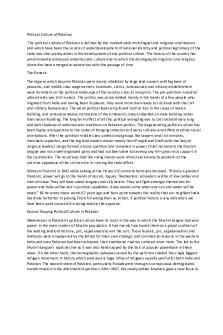
Political culture of Pakistan
- 11 Pages

The Theory of Political Culture
- 278 Pages

Political Culture Approach
- 4 Pages

5.Political culture
- 5 Pages
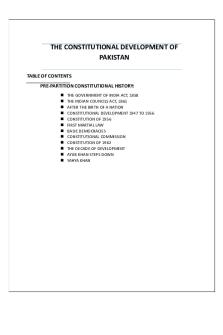
Constitutional History of pakistan
- 16 Pages
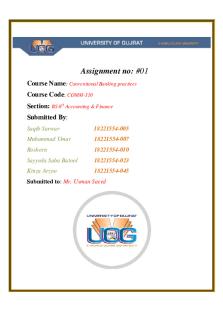
25 Banks of PAKISTAN
- 25 Pages
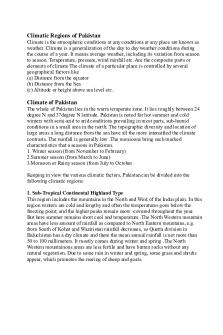
Climatic Regions of Pakistan
- 2 Pages
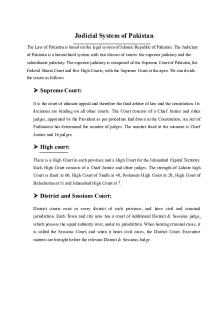
Judicial System of Pakistan
- 2 Pages
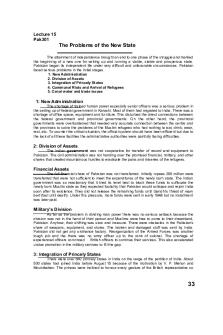
01 Early Problems of Pakistan
- 2 Pages
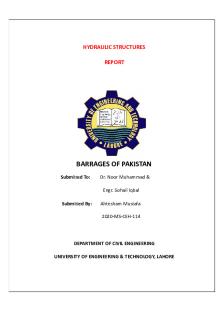
Barrages of Pakistan detail study
- 17 Pages
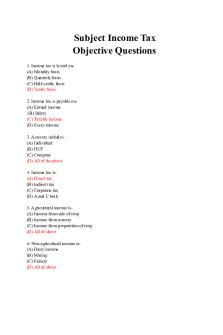
MCQs of Income Tax Pakistan
- 10 Pages
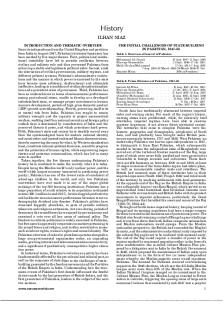
History Of Pakistan 1947-2017
- 15 Pages
Popular Institutions
- Tinajero National High School - Annex
- Politeknik Caltex Riau
- Yokohama City University
- SGT University
- University of Al-Qadisiyah
- Divine Word College of Vigan
- Techniek College Rotterdam
- Universidade de Santiago
- Universiti Teknologi MARA Cawangan Johor Kampus Pasir Gudang
- Poltekkes Kemenkes Yogyakarta
- Baguio City National High School
- Colegio san marcos
- preparatoria uno
- Centro de Bachillerato Tecnológico Industrial y de Servicios No. 107
- Dalian Maritime University
- Quang Trung Secondary School
- Colegio Tecnológico en Informática
- Corporación Regional de Educación Superior
- Grupo CEDVA
- Dar Al Uloom University
- Centro de Estudios Preuniversitarios de la Universidad Nacional de Ingeniería
- 上智大学
- Aakash International School, Nuna Majara
- San Felipe Neri Catholic School
- Kang Chiao International School - New Taipei City
- Misamis Occidental National High School
- Institución Educativa Escuela Normal Juan Ladrilleros
- Kolehiyo ng Pantukan
- Batanes State College
- Instituto Continental
- Sekolah Menengah Kejuruan Kesehatan Kaltara (Tarakan)
- Colegio de La Inmaculada Concepcion - Cebu


